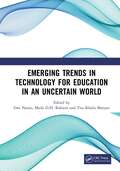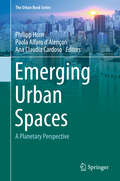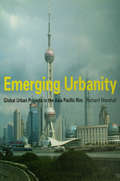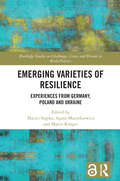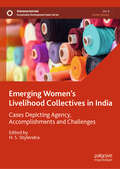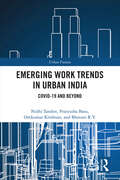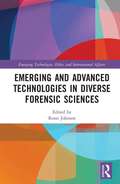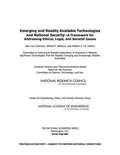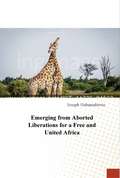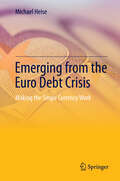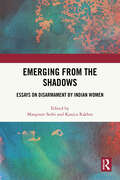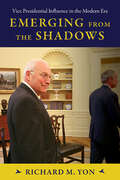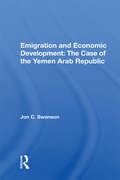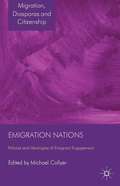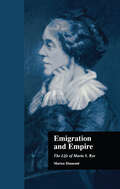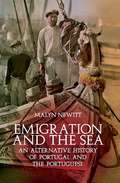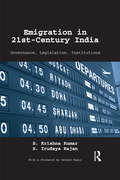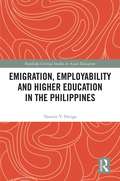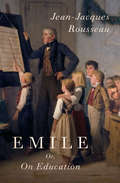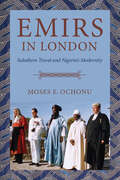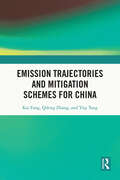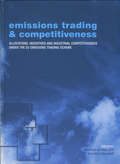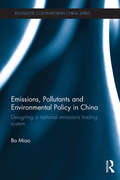- Table View
- List View
Emerging Trends in Technology for Education in an Uncertain World: Proceedings of the 6th International Conference on Education in Muslim Society, (ICEMS 2020), Jakarta, Indonesia, 18-19 November 2020
by Dwi NantoPresently, people are facing a condition called VUCA (Volatility, Uncertainty, Complexity, and Ambiguity) where this condition is described as a turbulent, uncertain, complicated, unclear condition. The world of work and industry is changing quickly, driven by the development of technology, information and communication. Advances in computer technology, artificial, intelligence, robotics which is also called as the industrial revolution 4.0 eras, are of significant influence on environment and people. A time where humans must learn quickly, and an era where the future is unpredictable, where choices for various conditions are increasing and mindsets are changing.The big challenge for educational institutions, especially Islamic educational institutions today, is how to prepare young people on various aspects of cognitive, mental, and spiritual preparedness to face the changing environment. Development in the real world is far more complex than what is learned in the classroom, so it is necessary to educate and transform curriculum that is directed in accordance with the demands of present times. The 6th International Conference on emerging trends in technology for education in facing VUCA (Volatility, Uncertainty, Complexity, and Ambiguity) is designed not only to share research, but also to offer recommendations to governments, educational institutions and other stakeholders to improve the quality of education through technology-based educational programs. The conference was held by Faculty of Education UIN Syarif Hidayatullah Jakarta. Scholars, researchers, policy makers, teachers, and students from various countries participated and worked together to discuss how to improve the quality of education in the Muslim community. Guided by UIN Jakarta, the 6th ICEMS of 2020 provided opportunities for various educational stakeholders especially in Muslim Communities around the world to share their creative and innovative works, opinions, and experiences in open academic forums.
Emerging Urban Spaces: A Planetary Perspective (The Urban Book Series)
by Philipp Horn Paola Alfaro D’Alençon Ana Claudia CardosoThis edited collection critically discusses the relevance of, and the potential for identifying conceptual common ground between dominant urban theory projects – namely Neo-Marxian accounts on planetary urbanization and alternative ‘Southern’ post-colonial and post-structuralist projects. Its main objective is to combine different urban knowledge to support and inspire an integrative research approach and a conceptual vocabulary which allows understanding the complex characteristics of diverse emerging urban spaces. Drawing on in-depth case study material from across the world, the different chapters in this volume disentangle planetary urbanization and apply it as a research framework to the context-specific challenges faced by many `ordinary' urban settings. In addition, through their focus on both Northern- and Southern urban spaces, this edited collection creates a truly global perspective on crucial practice-relevant topics such as the co-production of urban spaces, the ‘right to diversity’ and the ‘right to the urban’ in particular local settings.
Emerging Urbanity: Global Urban Projects in the Asia Pacific Rim
by Richard MarshallDiscussions on the global economy focus on the hyper-mobility of capital, the possibility of instantaneous transmission of information and money around the globe, the centrality of information outputs to our economic systems and emphasise the neutralisation of geography and of places. What is ignored, however, is that even the most advanced information industries need a material infrastructure of buildings and work processes, and considerable agglomeration, in order to operate in global markets. Further, the globalisation of economic activity has brought with it not only a vast dispersal of offices and factories, but also a growing importance of central functions to manage and coordinate such worldwide networks of activities. The development of global urban projects is one manifestation of this move towards centrality in urban situations. These large-scale urban projects are the result of governments' seeking competitive advantage in the global economy. They are critical components of a nation's global infrastructure. In the booming economies of the Asia Pacific Rim prior to the Asian Economic Crisis these urban developments were seen as key components of national economic policies. In their making they require a conscious effort to arrange material infrastructure and reinforce that there is a role for urban design in this making. Emerging Urbanity is an exploration of this role in nine global urban projects in the Asia Pacific Rim.
Emerging Varieties of Resilience: Experiences from Germany, Poland and Ukraine (Routledge Studies on Challenges, Crises and Dissent in World Politics)
by Marco Krüger Maciej Stępka Agata MazurkiewiczThis book focuses on developments of resilience in Europe, discussing its different interpretations and enactments, as well as approaches to national security and crisis and disaster management.Examining war-time resilience, increased refugee flows into the EU, societal resilience, and its general application of the concept in national security strategies, the book juxtaposes the multifaceted nature of resilience in different, yet connected, European countries. In doing so, it illuminates the multiplicity of approaches and interpretations that allows a deeper understanding of dynamically (re)developing approaches to resilience.This book will be of key interest to scholars, students, and practitioners working in crisis response, disaster management, and resilience and more broadly to European studies, migration studies, security studies, politics, public policy, and international relations.Chapter 4 and Chapter 6 of this book are freely available as a downloadable Open Access PDFs at http://www.taylorfrancis.com under a Creative Commons Attribution-Non Commercial-No Derivatives (CC-BY-NC-ND) 4.0 license.
Emerging Women’s Livelihood Collectives in India: Cases Depicting Agency, Accomplishments and Challenges (Sustainable Development Goals Series)
by H. S. ShylendraWith an overarching conceptual framework and a synthesis of findings, this book is a unique collection of the experiences of twenty diverse cases of women’s collectives, holding critical lessons for livelihood enhancement and women’s empowerment. The book is the result of a collaborative project between the development organisation viz, PRADAN, working to strengthen women-led collectives under the National Rural Livelihood Mission (NRLM), and a group of development and management scholars hailing from the Institute of Rural Management Anand (IRMA). Based on the documented cases using immersive methods and a feminist perspective, the book provides a critical analysis of the agency displayed by women and their collectives with the potential to induce changes in the socio-economic status of women hailing from disadvantaged sections. Inclusion, governance and leadership, financial intermediation, livelihoods, and social action are the major outcome dimensions of the collectives examined in the book, as highlighted under SDG-5 which calls for ensuring women’s effective participation and leadership and reforms to give women equal rights to economic resources. While the conceptual framework helps unravel the complex interlinkages visualised between women, livelihoods, and collectives, the cases in themselves and the synthesis objectively depict the lessons and challenges encountered by the collectives given the entrenched gender relations and the neoliberal policy narratives. This book serves as a source of real case studies for teaching and training, a reference work for researchers, and a guidance book for policymakers and practitioners.
Emerging Work Trends in Urban India: COVID-19 and Beyond (Urban Futures)
by Nidhi Tandon Pratyusha Basu Omkumar Krishnan Bhavani R.V.This book offers an overview of India’s emerging digital economy and the resulting challenges and opportunities for urban workplaces. It examines contemporary economic and social transformations in India by focusing on how new technologies and policies are shaping urban work practices and patterns. The book emphasizes inclusive and equitable practices that consider the needs of the formal and informal sector workforce as essential to India’s urban development. Drawing on cross-disciplinary frameworks, it examines key issues related to work trends in the Indian urban economy and its digital landscapes, including Industry 4.0 and technology–labour nexus, smart cities and innovation, urbanism and consumerism, workplace transitions such as service industry and remote work, digital divide, skill development initiatives, and the impact of socio-economic inequalities and disruptions. The authors provide perspectives on the digital future of urban work in India and other emerging economies in the post-COVID-19 phase, and underscore the importance of enacting balanced policies, remodelling institutions, and equipping the labour force for adapting to new demands related to future employability and investments. This book will interest students, teachers, and researchers of urban studies, urban sociology, sociology of work, labour studies, human and urban geography, economic geography, urban economics, development studies, urban development and planning, public policy, regional planning, politics of urban development, social and cultural change, urban sustainability, environmental studies, management studies, South Asian Studies, and Global South studies. It will also be useful to policymakers, non-governmental organizations, activists, and those interested in India and the future of the global economy.
Emerging and Advanced Technologies in Diverse Forensic Sciences (Emerging Technologies, Ethics and International Affairs)
by Ronn JohnsonAn important contribution to the professional work performed in the areas on emerging technologies, this book provides an extensive expansion of the literature base on contemporary theories and investigative techniques used in the forensic sciences. Forensic science, as a relatively new field of research still actively identifying itself in the larger landscape of the sciences, has been sharply criticized for utilizing techniques deemed largely unscientific by subject area experts. This book presents a collective analysis and review of the existing challenges as well as directions for state-of-the-art practices found in diverse forensic settings, enabling the reader to make an informed decision about the scientific validity of forensic techniques, and emphasizes the need for a greater understanding of the use of the most appropriate methodology and procedures. The contributors address cutting-edge, developing, and even hypothetical techniques and technologies in forensics research and practice, especially as it relates to the sphere of criminal justice and law enforcement in contemporary society. A useful work for forensics professionals, and students and scholars working in the fields of politics and technology, criminal justice, forensic psychology, police psychology, law enforcement, and forensic science.
Emerging and Readily Available Technologies and National Security
by National Research Council National Academy of Engineering Computer Science and Telecommunications Board Board on Life Sciences Committee on Science, Technology, and Law Committee on Ethical and Societal Implications of Advances in Militarily Significant Technologies that are Rapidly Changing and Increasingly Globally Accessible Center for Engineering, Ethics, and SocietyEmerging and Readily Available Technologies and National Security is a study on the ethical, legal, and societal issues relating to the research on, development of, and use of rapidly changing technologies with low barriers of entry that have potential military application, such as information technologies, synthetic biology, and nanotechnology. The report also considers the ethical issues associated with robotics and autonomous systems, prosthetics and human enhancement, and cyber weapons. These technologies are characterized by readily available knowledge access, technological advancements that can take place in months instead of years, the blurring of lines between basic research and applied research, and a high uncertainty about how the future trajectories of these technologies will evolve and what applications will be possible. Emerging and Readily Available Technologies and National Security addresses topics such as the ethics of using autonomous weapons that may be available in the future; the propriety of enhancing the physical or cognitive capabilities of soldiers with drugs or implants or prosthetics; and what limits, if any, should be placed on the nature and extent of economic damage that cyber weapons can cause. This report explores three areas with respect to emerging and rapidly available technologies: the conduct of research; research applications; and unanticipated, unforeseen, or inadvertent ethical, legal, and societal issues. The report articulates a framework for policy makers, institutions, and individual researchers to think about issues as they relate to these technologies of military relevance and makes recommendations for how each of these groups should approach these considerations in its research activities. Emerging and Readily Available Technologies and National Security makes an essential contribution to incorporate the full consideration of ethical, legal, and societal issues in situations where rapid technological change may outpace our ability to foresee consequences.
Emerging from Aborted Liberations for a Free and United Africa: [None]
by Joseph HabamahirweThe book "Emerging from Aborted Liberations for a Free and United Africa" is a translation of the French work "Sortir des libérations avortées pour une Afrique libre et unie" by Joseph Habamahirwe. It is a careful and thoughtful analysis of the many problems that the African continent and its peoples are still facing after more than 50 years of independence from direct colonial rule. It is a work of liberation theology and the author has been particularly influenced by the late African Sociologist and theologian Jean-Marc Ela.
Emerging from the Euro Debt Crisis: Making the Single Currency Work
by Michael HeiseDespite the success of policymakers and the European Central Bank in calming down financial markets since the summer of 2012, European leaders are still facing formidable challenges in making the single currency work in a complex environment. This book starts with a review of the necessary elements of a currency union and highlights the reasons why the system has run into its present troubles. It points to important policy recommendations to be drawn from a structural analysis of the currency union, achievements and failures of the currency union and ways to improve fiscal sustainability and arrive at stable macroeconomic performance for the union. It highlights the importance and the effectiveness of structural reforms that have to accompany fiscal consolidation and discusses the appropriate tools of crisis management and why a restructuring of the Eurozone is not the right step. Based on these considerations, a long-term target picture for the Eurozone as a part of the EU is outlined, providing a valuable contribution to a hopefully intense public debate in the coming years.
Emerging from the Shadows: Essays on Disarmament by Indian Women
by Manpreet Sethi Kanica RakhraNational security, war and strategy are mostly considered male preserves across the world even when, as professional scholars or policy practitioners, women have made significant contributions. Women voices and the subject of disarmament have been hidden in the shadows of mainstream security discourse for far too long. The book seeks to right-stream these by bringing together writings of women security experts, scholars and diplomats in India on issues of nuclear disarmament and non-proliferation. International efforts towards sustainable nuclear non-proliferation and disarmament are struggling to find the ‘right’ way. This book shifts the focus to the imperative of disarmament with women authors who share their perspectives on what the future for disarmament looks like and where India—a leading voice on disarmament—stands on these issues. The volume explores India’s nuclear disarmament journey; efforts towards and roadblocks in the implementation of nuclear disarmament verification; confidence building and nuclear risk reduction measures as pathways towards disarmament; nuclear energy and proliferation trends; linkage between nuclear non-proliferation and disarmament; and India’s commitment towards the Women, Peace and Security agenda.This volume will be of great interest to students and scholars, researchers, policymakers and members of the diplomatic community, in the fields of security and strategic studies, international relations, politics, disarmament diplomacy and nuclear policy.
Emerging from the Shadows: Vice Presidential Influence in the Modern Era (SUNY series on the Presidency: Contemporary Issues)
by Richard M. YonAlthough once derided as an insignificant office, the vice presidency in the last forty years has witnessed an increase in stature, prominence, and influence. Emerging from the Shadows focuses on explaining variation in vice presidential influence over time with an assumption that all vice presidents in the modern era have the capacity to exercise influence. This study is the first of its kind to ascertain the true nature of vice-presidential influence and the consequences of changing interpersonal, situational, institutional, and electoral dynamics on that influence using in-depth interviews and archival research. These four dynamics, as Richard M. Yon demonstrates, provide a model by which to understand the fluidity of vice-presidential influence, which in turn enables more precise analysis of the vice presidencies of Nelson Rockefeller, Walter Mondale, George H. W. Bush, Dan Quayle, Al Gore, Dick Cheney, and Joe Biden.
Emigration And Economic Development: The Case Of The Yemen Arab Republic
by Jon C. SwansonAlthough social scientists tend to agree that emigration improves the standard of living of migrants and their families, research suggests that more generally it has a neutral or even negative effect on economic development in the home country. The Yemen Arab Republic is a case in point: while living standards there have improved with emigration, t
Emigration Nations
by Michael CollyerUntil very recently emigrants were considered an embarrassment, an irritation or an irrelevance by most states. The long experience of emigrant engagement in certain historical emigration countries, such as Italy, was very much the exception. Since about 2000, countries around the world have shown much greater enthusiasm for policies to encourage the loyalty of nationals who have made a permanent home elsewhere. These developments have changed the relationship between state institutions and emigrant nationals. Policies of emigrant engagement also challenge fundamental understandings about the nature of political society in the modern era; the notion of states as territorial institutions or the understanding of citizenship as membership in a territorially bounded polity are both undermined. This book provides copious evidence of this process, with detailed, comparable case studies of twelve countries and a new theoretical framework that helps explain changing policies towards emigrants.
Emigration and Empire: The Life of Maria S. Rye (Literature and Society in Victorian Britain #Vol. 6)
by Marion DiamondFirst published in 1999. Routledge is an imprint of Taylor & Francis, an informa company.
Emigration and Political Development
by Jonathon W. MosesWhile policy makers, international organizations and academics are increasingly aware of the economic effects of emigration, the potential political effects remain understudied. This book maps the nature of the relationship that links emigration and political development. Jonathon W. Moses explores the nature of political development, arguing that emigration influences political development. In particular, he introduces a new cross-national database of annual emigration rates and analyzes specific cases of international emigration (and out-migration within countries) under varying political and economic contexts.
Emigration and the Sea: An Alternative History of Portugal and the Portuguese
by Malyn NewittToday Portuguese is the seventh most widely spoken language in the world and Brazil is a new economic powerhouse. Both phenomena result from the Portuguese "Discoveries" of the 15th and 16th centuries, and the Catholic missions that planted Portuguese communities in every continent. Some werepart of the Portuguese empire but many survived independently under other rulers with their own Creole languages and indigenized Portuguese culture. In the 19th and 20th centuries these were joined by millions of economic migrants who established Portuguese settlements in Europe, North America,Venezuela and South Africa - and in less likely places, including Bermuda, Guyana and Hawaii. Interwoven within this global history of the diaspora are stories of the Portuguese who left mainland Portugal and the islands, the lives of the Sephardic Jews, the African slaves imported into the Atlantic Islands and Brazil and the Goans who later spread along the imperial highways of Portugal andBritain. Much of Portugal's contribution to science and the arts, as well as its influence in the modern world, can be attributed to the members of these widely scattered Portuguese communities, and these are given their due in Newitt's engrossing volume.
Emigration in 21st-Century India: Governance, Legislation, Institutions
by S. Irudaya Rajan S. Krishna KumarEmigration in 21st-Century India is the first definitive exposition of contemporary Indian labour migration. The book provides a comprehensive appraisal of the policies, legislation and institutional architecture governing emigration at both federal and state levels. It posits that, geographically, emigration is now a more inclusive, pan-India phenomenon with many distinct features. It draws critical attention to the multiple dualities in Indian emigration, showing how the artificial distinction between a universal pravasi (‘expatriate’ or ‘migrant’) and a restricted aam pravasi (‘common emigrant’) distorts emigration governance. On the basis of extensive data from the Kerala Migration Survey (KMS) and National Sample Survey Organisation (NSSO) Rounds, it projects the emerging profile of the emigrant from new source states as also the likely number of migrants by 2021, drawing cross-country comparisons where appropriate. The work will be invaluable to scholars of migration and diaspora studies, economics, development studies and sociology, as well as policy makers, administrators, academics, and non-governmental organisations in the field.
Emigration, Employability and Higher Education in the Philippines (Routledge Critical Studies in Asian Education)
by Yasmin Y. OrtigaThis book investigates the dilemma of educating students for future work in the context of the Philippines, one of the top sources of migrant labor in the world. Here, colleges and universities are expected to not only educate students for jobs within the country, but for potential employers beyond national borders. It demonstrates how human capital ideology reinforces such export-oriented education, creating an assumed relationship among academic credentials, overseas opportunity, and future migrant remittances. Findings indicate that attempts to produce migrant workers undermine the job security of college instructors, skew local curriculum towards foreign requirements, and challenge efforts to develop academic programs in line with local needs. As more developing nations turn to migration as a development strategy, colleges and universities face increasing pressures to produce future migrant workers who will have an advantage over other nationalities. This book emphasises the importance of understanding how this global phenomenon affects colleges and universities, as well as the teachers and students within these institutions. This book raises important questions on the role of universities in today’s global economy and the effects of contemporary migration flows on developing countries.
Emile: Or On Education
by Jean-Jacques Rousseau Barbara FoxleyThe once banned and burned treatise on the nature of education from the eighteenth-century philosopher and author of The Social Contract. Considered by Jean-Jacques Rousseau himself to be the &“best and most important&” of all his writings, Émile set off a firestorm when it was first published in 1762. It was banned in Paris and burned in Geneva, but later served as the inspiration for a new national system of education during the French Revolution. In its pages, Émile and his tutor embark on a scholarly journey through the boy&’s upbringing. The book also follows the character of Sophie, commenting on the role of women in society. &“More a tract upon education with the appearance of a story than it is a novel, the book describes the ideal education which prepares Émile and Sophie for their eventual marriage&” (The Roots of Educational Theory). &“Jean-Jacques Rousseau&’s Émile or Treatise on Education remains relevant today. The theories and beliefs of Enlightenment philosophers such as Rousseau played a big role in shaping the beliefs of the public at the time, particularly when they were able to distribute their ideas on paper. Without written documents such as this one, it would be impossible to understand their impact on society and, more broadly, on how the idea of nature-based gender and separated spheres have evolved to what they are today.&” —Towards Emancipation?
Emily Gets Her Gun: But Obama Wants to Take Yours
by Emily MillerIn the wake of tragic shootings in Newtown and Aurora, the anti-gun lobby has launched a campaign of lies, distortion, misrepresentation, and emotional manipulation that is breathtaking in its vitriol and its denial of basic facts. Their goal is to take away our Second Amendment rights and then disarm law-abiding Americans.Emily Miller tells her personal story of how being a single, female victim of a home invasion drove her to try to obtain a legally registered gun in Washington, D.C. The narrative-sometimes shocking, other times hilarious in its absurdity-gives the reader a real life understanding of how gun-control laws only make it more difficult for honest, law-abiding people to get guns, while violent crime continues to rise.Using facts and newly uncovered research, Miller exposes the schemes politicianson Capitol Hill, in the White House, and around the country are using to deny people their Second Amendment rights. She exposes the myths that gun grabbers and liberal media use to get new laws passed that infringe on our right to keep and bear arms.The gun rights debate isn't just about firearms. It's about protecting a fundamental right that is enshrined in the U.S. Constitution. It's about politicians who lie, manipulate, and outright break existing laws to get what they want. It's about President Obama wanting a bigger federal government to control you. Not just your guns-you. The fight for gun rights is the fight for freedom. Emily Miller says stand up and fight back now because your Second Amendment will only be the first to go.
Emirs in London: Subaltern Travel and Nigeria's Modernity
by Moses E. OchonuEmirs in London recounts how Northern Nigerian Muslim aristocrats who traveled to Britain between 1920 and Nigerian independence in 1960 relayed that experience to the Northern Nigerian people. Moses E. Ochonu shows how rather than simply serving as puppets and mouthpieces of the British Empire, these aristocrats leveraged their travel to the heart of the empire to reinforce their positions as imperial cultural brokers, and to translate and domesticate imperial modernity in a predominantly Muslim society. Emirs in London explores how, through their experiences visiting the heart of the British Empire, Northern Nigerian aristocrats were enabled to define themselves within the framework of the empire. In doing so, the book reveals a unique colonial sensibility that complements rather than contradicts the traditional perspectives of less privileged Africans toward colonialism.
Emission Trajectories and Mitigation Schemes for China
by Kai Fang Qifeng Zhang Yiqi TangThis book seeks to model the possible emission trajectories and identify the feasible mitigation schemes for China to meet its climate commitments to peak emissions before 2030 and net zero emissions before 2060. In line with these ambitions, China has taken a number of measures to improve carbon efficiency and energy structure in recent years. The book first analyzes changes in the carbon footprint at the city level, identify the different pathways to peak emissions by province and industry, and develop a bottom-up approach to determining when and how China could reach peak emissions. It then illustrates how the Emissions Trading Scheme (ETS) reduces abatement costs, and examines the cost-saving effects under carbon intensity reduction and peak emissions targets. Based on the findings and the status quo in China, the authors propose a multicriteria allocation scheme for carbon emission allowances at the provincial level and quantify the impact of sectoral coverage on the abatement costs of the ETS by developing a cost-based approach to sectoral coverage in China. In addition, the co-benefits between CO2 and PM2.5 reductions as a result of the ETS operation are elaborated. The book will benefit researchers and policy-makers interested in environmental governance, climate policy, environmental economics, and sustainable development.
Emissions Trading and Competitiveness: Allocations, Incentives and Industrial Competitiveness under the EU Emissions Trading Scheme (Climate Policy Series)
by Michael GrubbComplying with the forthcoming tightening of CO2 emission allocations in the EU may mean big bills for the industries affected. In this special issue of Climate Policy journal, leading experts examine the impacts on competitiveness and the commercial incentives available from the CO2 allowance allocations under the methodologies, and whether - and if so at what stage - the ETS itself may need to be amended. The study is multidisciplinary, combining economic, legal and policy analysis with specific studies of impacts on electricity, cement and other industrial sectors and the allocation issues. It brings together the results of research conducted over the past two year from various research centres and consultancies in Europe, and in particular, work commissioned by the Carbon Trust and Climate Strategies Network. Through these, it presents the most comprehensive and detailed set of analyses yet conducted of the impacts of allocation on competitiveness - one of the most critical issues for the sectors affected and for the operation of the ETS.
Emissions, Pollutants and Environmental Policy in China: Designing a National Emissions Trading System (Routledge Contemporary China Series)
by Bo MiaoAs the world's biggest polluter, the environmental challenges that China faces in controlling its airborne emissions are crucial, not only to its own population in terms of tackling the severe domestic air pollution, but also to the planet as it faces calls from the international community to accept its responsibilities in cutting greenhouse gases. Deteriorating air quality clearly shows that China’s current environmental regime is unsuited to either tackle the rampant domestic air pollution or contribute fairly to international climate action. As such, this book explores the feasibility of applying a national emissions trading system to control multiple air pollutants in China. It begins with an outline of the existing emissions management system and goes onto explore whether a national emissions trading system is a viable choice to combat China’s conventional air pollutants. To this end, there is an in-depth analysis of the two pilot sulphur dioxide emissions trading programs in Taiyuan and Jiangsu, as well as an examination of emissions trading schemes in the US and EU. Finally, the book discusses the key design elements of a multi-pollutant cap-and-trade scheme that addresses both conventional air pollutants and greenhouse gasses. This book will be of great interest to students and scholars interested in the fields of environmental studies, Chinese politics and environmental law. It will also be invaluable to policy makers in the field.
